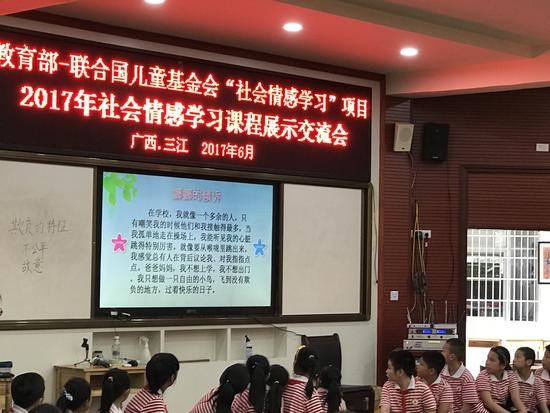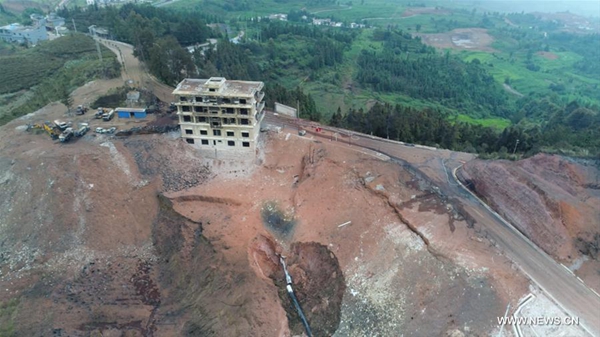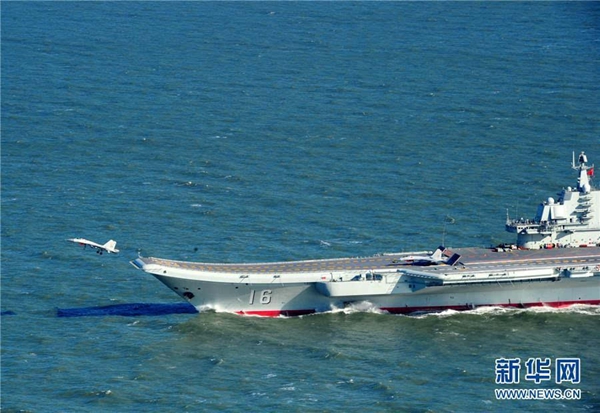|

|
|
A social and emotional learning (SEL) class is given to students at Sanjiang Ethnic Experimental School in Sanjiang Dong Autonomous County. [Photo/Xinhua]
|
At a school in south China’s Guangxi Zhuang Autonomous Region, several children shed tears as they share their experience of being bullied.
“He broke my pencil without any reason, punched me, and gave me a bloody nose after I asked him to pay for my pencil,” a fourth-grader recalls.
The boy takes off his glasses, briefly wipes his tears then bursts out crying again. His teacher walks over and gives him a hug.
The class at Sanjiang Ethnic Experimental School in Sanjiang Dong Autonomous County is called social and emotional learning (SEL). It is a joint project run by the Ministry of Education and UNICEF.
SEL is about helping students develop skills such as self-recognition and confidence, understanding and managing emotions, and maintaining positive relationships with others. “Say ‘no’ to bullying” is one of the topics.
During the course, Zhou Lihong, the teacher, tells a story of an imaginative but introverted girl’s long-term bullying and asks students for ways they would help the girl.
Some suggest making friends with her, some advise her to turn to teachers or parents for help, someone suggests “an eye for an eye.”
“Bullying is constant and intentional, initiated by the stronger against the vulnerable. We should learn to protect ourselves, and meanwhile, never bully others,” Zhou tells the children.
UNICEF educationalist Guo Xiaoping says that since launch of the SEL project in 2013, the number of participating schools has increased to over 500.
These schools are mainly in less-developed middle and western parts of the country, said Guo.
“With the support from local education authorities and experts, some schools that are not included into the pilot have also joined in,” she said.
Wu Xinyun, head of the primary section at the Sanjiang school, says students receive an SEL lesson every two weeks, using textbooks provided by the project.
“We have found there is less physical conflict among the children,” she said.
Each class has around 60 students, more than the advised national maximum of 45. “Physical contact is very frequent in the classroom, and often led to fights in the past. SEL helps students understand each other, so brawls are much more infrequent,” Wu said.
Guo says a study of US primary and high schools and kindergartens in 2011 found SEL participants did 11-percentage points better than control groups.
Wei Jiaqi, 12, has drawn a picture of a classmate holding an umbrella for her in rain. She names the drawing, “Thanks for caring about me.”
“I was upset as my mom had scolded me that day. It was my classmate who kept me company,” she says.
“I changed my girl pal into a boy, because drawing a boy is easier,” she says, adding that they like the SEL courses very much.
Li Fuzhuo, head of teacher education at Guangxi Normal University, said SEL is meant to create an atmosphere in which students feel, experience, think and acquire the related skills. Competent teachers are vital.
To address this issue, the ministry and UNICEF organize training and demonstration courses for school heads and teachers.
The project also encourages parents to participate and the team is compiling articles about SEL to be released via the UNICEF WeChat account.
In this way, parents, especially migrant workers who have left their children behind, will be able to join in the SEL project.
Huang Guizhen, an official at the education ministry, believes SEL not only improves teaching competence, but enables vulnerable groups, such as left-behind children, to feel more care and love from school and the family.
“We want to expand the project to more schools, so that more children benefit from it,” she said.


